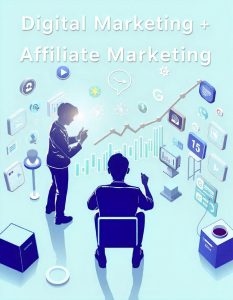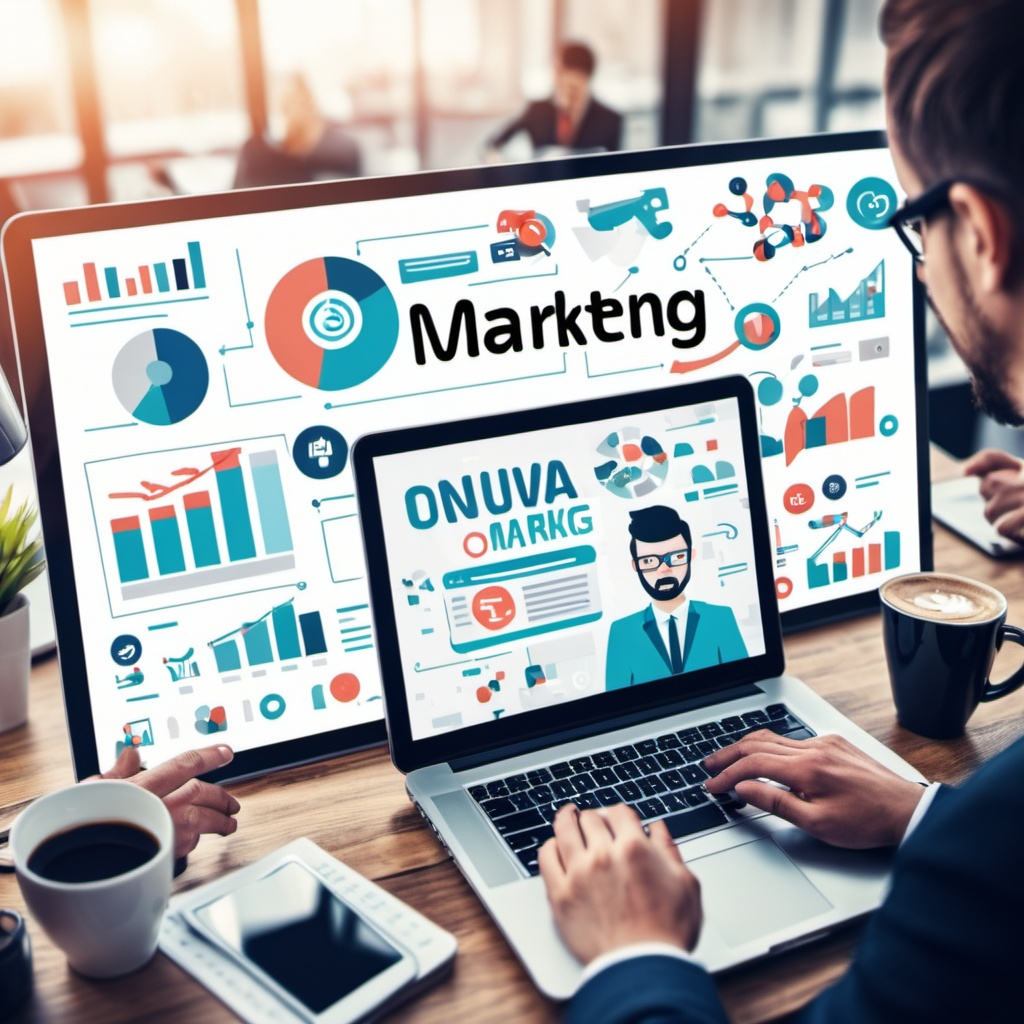What Digital Marketing Skills Are in Demand?
As businesses increasingly rely on online channels to reach their audience, the demand for skilled digital marketers continues to grow. Whether you’re a seasoned professional or just starting in the field, understanding which digital marketing skills are in demand can give you a competitive edge in the job market and help you stay relevant in a dynamic industry.
Affiliate Marketing for Remote Workers: How to Start Earning Commissions from Your Digital Presence
1. Search Engine Optimization (SEO)
Search Engine Optimization (SEO) is one of the most fundamental and in-demand skills in digital marketing. SEO involves optimizing websites and content to rank higher in search engine results pages (SERPs). The higher a website ranks, the more traffic it is likely to receive.
SEO is essential for any business looking to increase its online visibility. Professionals skilled in SEO understand how to research and target relevant keywords, optimize website structure, and create content that appeals to both search engines and users.
In demand are specialists who are proficient in:
- Keyword research to find high-traffic search terms.
- On-page SEO to optimize individual pages.
- Technical SEO to improve site performance and user experience.
- Link building to increase domain authority.
With search engines like Google continuously updating their algorithms, SEO is a skill that requires ongoing learning and adaptation.
2. Content Marketing
Content is the backbone of most digital marketing strategies. Businesses need high-quality, engaging content to attract and retain customers. Content marketing involves creating, distributing, and promoting content that is valuable and relevant to a target audience.
Content marketing professionals are in demand for their ability to:
- Write and edit compelling blog posts, articles, and web pages that provide value to the audience.
- Create multimedia content such as videos, podcasts, and infographics that resonate with users.
- Develop content strategies that align with business goals and customer needs.
- Optimize content for search engines to drive organic traffic.
With the explosion of digital media, brands are looking for content creators and strategists who can help them stand out and engage their audience through storytelling and education.
Top Free Digital Marketing Online Courses to Boost Your Skills (Get List And Websites)
3. Social Media Marketing
Social media has become an indispensable channel for businesses looking to connect with their audience. Social media marketing involves promoting products, services, or content on platforms like Facebook, Instagram, LinkedIn, Twitter, and TikTok.
Businesses need social media marketers who can:
- Develop and execute social media strategies that align with business objectives.
- Create engaging content that encourages likes, shares, and comments.
- Monitor and analyze social media metrics to measure the success of campaigns.
- Manage paid social media advertising campaigns to reach larger, targeted audiences.
The ability to stay on top of social media trends, engage with followers in real time, and manage multiple platforms is a key skill that businesses seek in digital marketers.
4. Pay-Per-Click Advertising (PPC)
Pay-per-click (PPC) advertising is a highly effective digital marketing strategy where businesses pay a fee each time their ad is clicked. PPC ads are most commonly used on search engines (e.g., Google Ads) and social media platforms.
The demand for PPC specialists is growing as businesses seek to maximize their return on investment (ROI) through targeted, cost-effective advertising. A PPC expert should be able to:
- Develop and manage ad campaigns on platforms like Google Ads, Facebook Ads, and Instagram Ads.
- Conduct keyword research to target relevant terms that will generate traffic and conversions.
- Analyze ad performance to optimize campaigns and improve results.
- Manage advertising budgets efficiently to maximize ROI.
With more businesses looking to advertise online, PPC skills are in high demand for driving immediate traffic and generating leads.
Affiliate Marketing with Us – Sell our Digital Products as an affiliate marketer
5. Data Analytics
In today’s data-driven world, digital marketers must be able to analyze and interpret data to make informed decisions. Data analytics involves collecting and examining data from various digital marketing channels to measure performance and identify areas for improvement.
Skills in demand for data analytics include:
- Tracking and measuring key performance indicators (KPIs) such as website traffic, conversion rates, and engagement metrics.
- Using analytics tools like Google Analytics, SEMrush, and social media analytics platforms to monitor campaigns.
- Interpreting data to uncover insights and trends that can inform marketing strategies.
- Reporting findings to stakeholders in a clear and actionable manner.
As businesses increasingly rely on data to shape their marketing efforts, the ability to gather and analyze data is essential for any digital marketer.
6. Email Marketing
Despite the rise of social media and other digital platforms, email marketing remains one of the most effective channels for engaging customers and driving conversions. Email marketing involves creating and sending personalized, targeted messages to subscribers.
Businesses are looking for digital marketers who can:
- Create and manage email marketing campaigns that promote products, services, or content.
- Segment email lists to ensure the right messages are sent to the right audience.
- Write compelling email copy that encourages recipients to take action.
- Optimize emails for mobile devices and improve open and click-through rates.
With email marketing consistently delivering strong ROI, businesses continue to seek professionals with skills in email campaign management and optimization.
7. Conversion Rate Optimization (CRO)
Conversion rate optimization (CRO) is the process of improving the percentage of website visitors who complete a desired action, such as making a purchase, signing up for a newsletter, or filling out a form. CRO specialists focus on enhancing the user experience and making websites more effective at driving conversions.
In-demand skills for CRO include:
- A/B testing to determine which versions of a webpage or ad perform better.
- Analyzing user behavior to identify pain points in the customer journey.
- Improving website design to increase conversions and user satisfaction.
- Testing and optimizing calls-to-action (CTAs) to encourage more interactions.
Businesses are always looking to improve their conversion rates, making CRO expertise highly valuable in digital marketing.
8. Mobile Marketing
As mobile devices continue to dominate internet usage, mobile marketing has become a critical area for businesses to focus on. Mobile marketing involves reaching customers on smartphones and tablets through strategies such as SMS marketing, mobile-optimized websites, and mobile apps.
Professionals in mobile marketing are expected to:
- Optimize websites and content for mobile devices to ensure a seamless user experience.
- Develop mobile marketing campaigns that are tailored to the behaviors and preferences of mobile users.
- Create and manage mobile app marketing strategies to drive downloads and engagement.
- Utilize location-based marketing techniques to target users based on their geographic location.
The ability to create mobile-friendly experiences and campaigns is essential as more consumers rely on their smartphones for browsing, shopping, and communication.
How To Make Money With The Moniepoint Bank App
Businesses are looking for professionals with a diverse range of skills to help them stay competitive. From SEO and content marketing to data analytics and mobile marketing, the demand for digital marketers with specialized expertise is on the rise. By staying up-to-date with the latest trends and mastering these in-demand skills, marketers can not only enhance their career prospects but also contribute to the long-term success of the businesses they serve.
How to Earn Money Online – The Ultimate Guide to Financial Freedom
Subscribe to Safegate World for daily updates.
Check Out Our Premium Services
To Advertise, Advertise Your Affiliate Links on Safegateworld.com
Become a Digital Marketer – Your Complete Guide with 500 Digital Marketing Sites To Start Your Career Immediately!
Related Articles
Can Digital Marketing Make You Rich?
Digital Marketing and Affiliate Marketing
What Is Search Engine Optimization (SEO)?
Pay-Per-Click (PPC) Advertising













